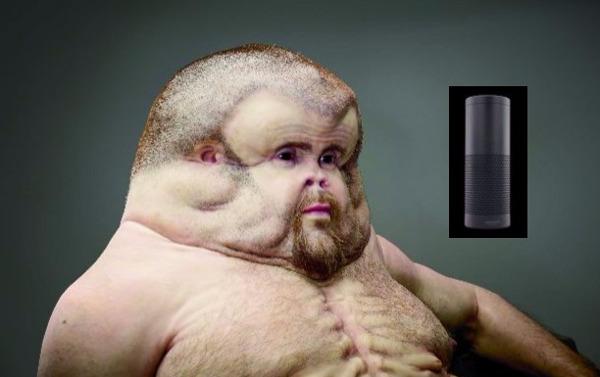You describe what happens to humans after a few generations in Pixar's WALL-E.
Alexa, No Thanks.

Car crashes have caused Graham to evolve accordingly. His thick head is appropriately helmet-like for mitigating brain injuries; he doesn’t have a neck to snap; his flat face doesn’t have much of a nose to get broken; and his chest has airbag-like padding. And after enjoying Alexa for a period of time, I think you’ll look about the same.
Alexa, of course, is Amazon’s very capable artificially intelligent assistant, first appearing in the Echo speaker. Thanks to her always-listening microphone array, she responds to your voice commands and requests. If you ask nicely, you can stream something to your stereo, watch something on TV, check the news, traffic, and weather reports, order a pizza, and, not surprisingly, buy stuff from Amazon. With 3,000 recognizable commands, she is probably about 2,995 words more conversant than your dog.
Alexa was originally a small, clever thing, but she quickly grew in popularity. Thanks to Alexa, Amazon’s Echo, Dot, and Tap speakers quickly sold millions, and the new Amazon Music Unlimited streaming service is voice-driven by Alexa. Alexa will be appearing in all kinds of non-Amazon products. Look for Alexa in Denon’s Heos line of multiroom products, in the Sonos ecosystem, and in smart home products from companies like Control4, Lutron, Crestron, and Savant. Also, DTS’s Play-Fi whole-home technology is getting Alexa; you’ll be able to use an Amazon speaker to voice-control music on a DTS Play-Fi-enabled speaker (encompassing 16 brands).
Alexa is proliferating because Amazon is cutting implementation costs. The low price point will make Alexa universally popular. For now, Siri is still stuck in the Apple ecosystem, in devices that cost hundreds or thousands of dollars. Alexa is cheap. The Echo Dot add-on has Alexa ready and willing to send music to any existing powered speaker with Bluetooth or an analog input for all of 50 bucks. Amazon’s newest Fire TV Stick still only costs 40 bucks, but it has Alexa now. And
Amazon isn’t slowing down; it now has more than 1,000 employees working on Echo and Alexa technology and is trying to fill 400 more positions. According to Jeff Bezos, this is “just the tip of the iceberg.” Clearly, voice integration is the next big thing in audio products.
Soon, I expect everything will have an Alexa (or Siri, Cortana, or Google Assistant) obediently listening electronic servant. And having a voice assistant hovering ubiquitously around you brings us back to Graham, the creepy crash guy. After a while, thanks to Alexa, we’ll all evolve to look something like Graham. Whatever you need, just ask, and Alexa will provide. Our heads will grow big and neckless because we’ll never need to take our eyes off our big screens. Our bellies will grow fat because we’ll never need to leave our La-Z-Boys. Our arms will be skinny because we won’t even have to pick up the remote.
You think I’m kidding? Suppose you wanted to hear “Stairway to Heaven.” In the old days, you had to walk over to your record shelf, find Led Zeppelin IV, then play it. Now, you just press a few buttons on your browser or phone. And with Alexa and her friends, you won’t even need to move your fingers or pick up your phone. Just sit there, and ask. She’ll be happy to help you, Graham.

You describe what happens to humans after a few generations in Pixar's WALL-E.
Alexa, No Thanks.

Alexa also works with Logitech Harmony remotes but hitting one button on the remote is a lot simpler than telling Alexa what you want. About the only thing we use it for is compiling grocery or to do lists.

Hmm...Amazon has 1000 employees working on Alexa and seeks to hire up to 400 more. I've got an idea related to the Prime Music Service which is one of Amazon's two tiers of delivering streaming music. How about at least hiring one person to work on the sound quality of these services. After listening often for the course of a bit over a year I've found the sound quality often lackluster. Is this the original source, the encoding of that source, or something inherent in Amazon's delivery? Amazon needs to switch at least one of the 1400 people working on Alexa to curating what is the absolute best audio quality version of each song in it's library and making that be the default one so a listener can be sure the version you end up hearing is the best example of that song Amazon can offer. Right now it's potluck, but if they put fidelity first the service, especially with it's new paid version called Unlimited, could be a real contender as well as having benefits of Alexa integration. I think Amazon needs to also go the Tidal route and within the paid service have HD resolution tracks. Right now Alexa isn't compelling so much to folks like me...however, if I could say Alexa play "You Ain't Going Nowhere" by The Byrds in 24/96 resolution I'd be all over it.